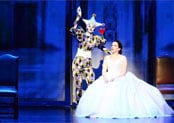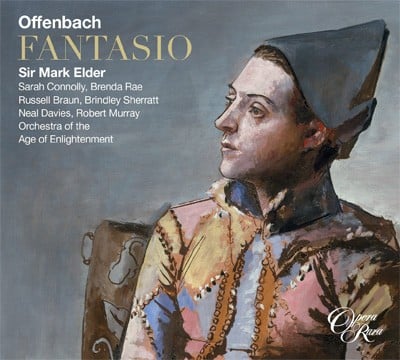OPERA SEARCH

Fantasio (OEK critical edition)
(1869-70)Libretto by Paul de Musset and Charles Nuitter, based on the comedy by Alfred de Musset; new German version; new English version by Richard Duployen (F,G,E)
S/M/T,colS,4T,Bar,BBar,2B; chorus;
2(II=picc).2.2.2-4.2.3.0-timp.perc-strings
Abbreviations (PDF)
Bote & Bock
Paris
Company: Opéra-Comique
| THE KING OF BAVARIA | Lyric Bass |
| THE PRINCESS | Coloratura Soprano |
| FANTASIO, a student | Lyric Tenor / Mezzo-Soprano / Soprano |
| THE PRINCE OF MANTUA | Lyric Baritone |
| MARINONI, his adjutant | Buffo Tenor |
| FLAMEL, the princess's nurse | Mezzo-Soprano |
| Students: SPARCK | Bass Baritone |
| FACIO | Tenor |
| MAX | Tenor |
| HARTMANN | Bass |
| Ladies and gentlemen of the court, citizens, students |
The action takes place between Munich's royal residence and the university with its liberal-minded students. The young and beautiful princess, courted by many a student, is supposed to marry a prince she does not know. The happy townspeople celebrate the eve of the union with singing and a torchlight procession, but the students do not share in the carefree jubilation. Fantasio, in particular, feels pity for the princess who is supposed to give her first love to an absolute stranger. He is happy to seize the occasion to dress as a jester in order to be near her and to help her, his happiness partly deriving from the fact that he is in immediate danger of getting caught and arrested by the police because of his debts. Due to an accident, the old jester has just died and is borne to his grave with ironic pathos. Fantasio climbs the park wall in a jester's costume and disappears into darkness, towards adventure and the princess… Ludwig Berger
The masterpiece Fantasio, which has long been unjustly neglected, is a "missing link" between Offenbach’s great Romantic opera Les Fées du Rhin and his musical theater legacy, the Contes d’Hoffmann. A part of the autograph score is today found in London, another in New York, and yet another in the archive of a branch of the Offenbach family, the doors of which have just recently been opened. In the edition of Fantasio, we followed the same principle of comprehensiveness that we have followed in all the preceding editions of works, and will successively make available all three preserved versions: the so-called "version de Paris," the version of the premiere of the work on 18 January 1872 in which the title role was sung by a mezzo-soprano, and that has enjoyed a well-deserved and growing success on the stage as well as in the concert hall since the release of the first complete recording on the English "Opera Rara" label in late 2014; the Vienna version, premiered on 21 February 1872, in which Offenbach reworked the title role into a soprano part for Marie Geistinger, and that was already the subject of a first reconstruction at the Musiktheater im Revier in Gelsenkirchen, based on the research of the Offenbach scholars Robert Pourvoyeur and Peter Hawig; and finally, the original version of the work in which the title role was conceived for tenor, since the role of the melancholy student Fantasio was originally supposed to be taken by Victor Capoul, a favorite of the Parisian public, who had already shined earlier in Offenbach’s Vert-Vert, but who departed Paris for London even while Fantasio was nearing completion, and was never to return after the end of the Franco-Prussian War.
Between the three versions, there are not only variants necessitated by the adaptations to the different voice ranges. In the reworkings, Offenbach also made formal changes in the structure of the work. Thus, at the Berlin premiere of the original version in 2016, over 140 years after its composition, a series of choruses, ensembles, and arias were heard for the first time, true jewels that Offenbach had already composed, but that were replaced by alternative numbers during the process of reworking or deleted for dramaturgical reasons.
The first version of Offenbach’s Fantasio does not represent a definitive version, since Offenbach, opting for versions for mezzo-soprano and soprano, did not stage it himself during his lifetime. Nevertheless, it lets us experience the completely different character of this masterpiece as it was originally conceived before a twist of fate was to lend it an entirely different color.
Jean-Christophe Keck
"The revival, using Jean-Christophe Keck’s critical edition, reveals a work that deals in refined shifts in mood from a composer primarily associated, now as then, with in-your-face directness… Offenbach's unease at being pigeonholed as a popular entertainer informs the score, which is characterised by a refined melancholy…" (Tim Ashley, The Guardian, 16 Dec 2013)
“Offenbach discards here his status as a simple (although brilliant) maker of cancans... Fantasio is the story of a dandy with a sharp tongue and soft heart, who would sacrifice his life ‘for a little love’, and in doing so goes so far as to slip into the role of the deceased royal jester…”
Le Monde
“If the production made a sensation, then it was through the rediscovery of the music – the music of an underestimated Offenbach... He undoubtedly saw a likeness of himself in this figure of a disillusioned commoner with fluctuating moods and disguised as a court jester – entirely trapped in the costume of a laughter-maker for his audience.”
Le Figaro
Comic, Poetic, Romantic

Sarah Connolly / Russell Braun / Robert Murray / Brenda Rae / Victoria Simmonds / Neal Davies / Brindley Sherratt / Aled Hall / Gavan Ring / Orchestra of the Age of Enlightenment / Opera Rara Chorus / Sir Mark Elder
Opera Rara ORC51
